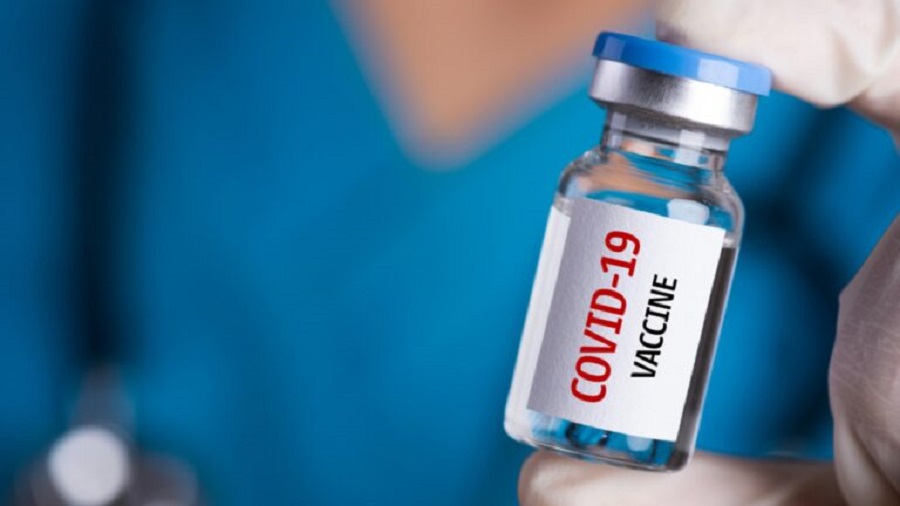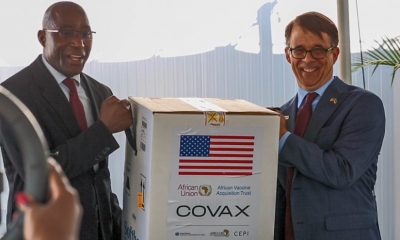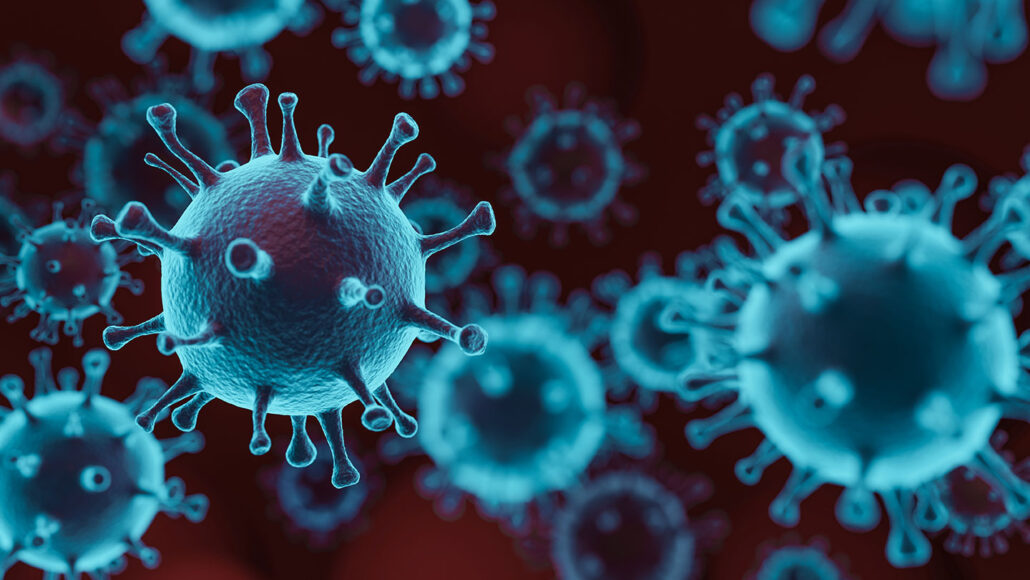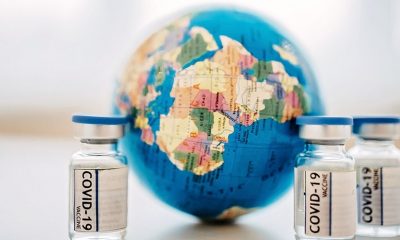Health
Russian COVID-19 Vaccines Disappear from Africa’s Radar
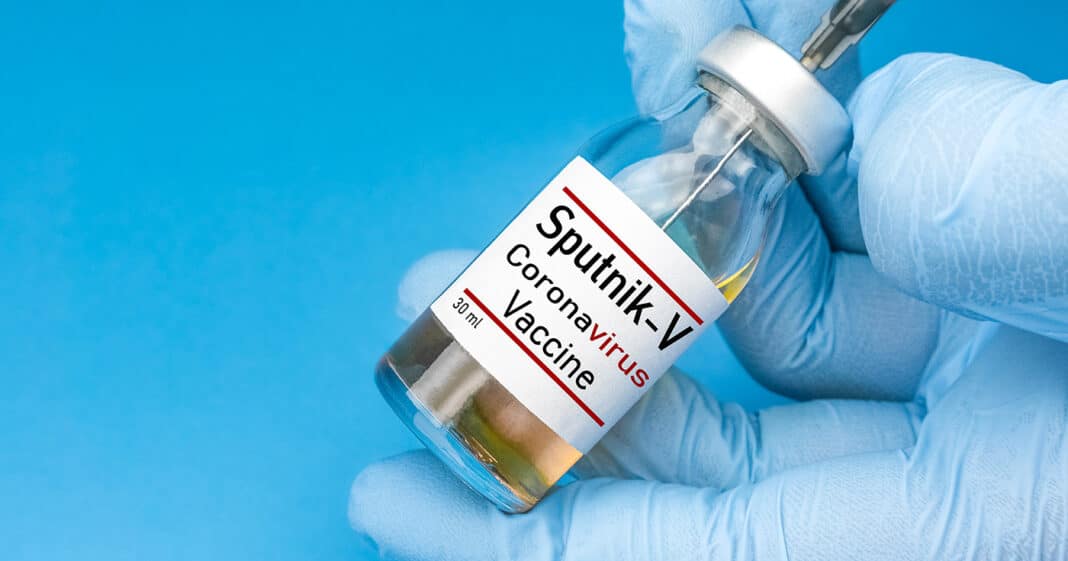
By Kestér Kenn Klomegâh
Until recently, Africa has not been high on Russia’s policy agenda. African leaders have to understand that Russia, for the past three decades, Africa was at the bottom of its policy agenda. After the end of the Soviet era, Russia has focused broadly on the United States and Europe, dreaming of becoming part of Europe, part of the configuration of the Global North. The low economic presence of Russia from 1991 until 2019 was a testament to the fact that Africa was at the bottom of its priority list. Of course, the October 2019 summit was symbolic, but after that, Russia has left most of the bilateral agreements undelivered across Africa.
With its “special military operation” on Ukraine that necessitated the imposition of stringent sanctions from the United States, European Union and their allies, the United Nations Security Council, mounting pressure on Russia since February 24 2022, pushes Russia to begin soliciting aggressively for support in Africa. Last July, in an article posted to its official website, Foreign Minister Sergey Lavrov wrote: “The development of a comprehensive partnership with African countries remains among top priorities of Russia’s foreign policy; Moscow is open to its further build-up multifaceted relations with Africa.”
In his Op-Ed article, Lavrov argues: “We have been rebuilding our positions for many years now. The Africans are reciprocating. They are interested in having us. It is good to see that our African friends have a similar understanding with Russia.” Lavrov, however, informed about broadening African issues “in the new version of Russia’s Foreign Policy Concept against the background of the waning of the Western direction” and this will objectively increase the share of the African direction in the work of the Foreign Ministry.
Lavrov consistently displays his passion for historical references. Soviet support for struggles for political independence and against colonialism should be laid to rest in the archives. The best way to fight neo-colonialism is to demonstrate by investing in those competitive sectors and depart away from hyperbolic rhetoric on an endless list of sectors. In practical terms, we rather face today’s development challenges and what is in store for the future generation. Africa today does not need anti-Western slogans; Africa simply needs external players who would passionately and genuinely invest in the critical economic sectors. The fundamental fact is that Africa is making efforts to transform its economy to create employment, modern agriculture, and industrialize the continent, especially with the introduction of the African Continental Free Trade Area (AfCFTA).
Despite criticisms, China has built an exemplary distinctive economic power in Africa. Besides China, Africa is largely benefiting from the European Union and Western aid flows and economic and trade ties. Compared, Russia plays very little role in Africa’s infrastructure, agriculture and industry and makes little effort to leverage the African Continental Free Trade Area (AfCFTA). Our monitoring shows that the Russian business community hardly pays attention to the significance of the African Continental Free Trade Area (AfCFTA), which provides a unique and valuable platform for businesses to access an integrated African market of over 1.3 billion people.
Lavrov’s efforts toward building non-Western ties in these crucial times are highly commendable, especially with Africa. But, the highly respected Minister easily and most times forgot the fact that during these two-three years of a global pandemic, the coronavirus that engulfed the planet, in every corner of the world, Africa was desperately looking for vaccines. Health authorities are still warning that Covid-19 has not been completely faced throughout the world.
Quartz, a reputable global media, reported early this year that “as of the end of 2022, about a quarter of the population of African countries has been fully vaccinated against Covid-19, according to the latest figures shared by Africa CDC. The coverage varies drastically depending on the country. In Liberia, for instance, nearly 80% of the population is fully vaccinated, while only 34% is in neighbouring Sierra Leone. Congo, Sudan, Senegal, and Madagascar all have vaccination rates below 10%.
In his briefing, Ouma said the target for Africa remains to vaccinate 70% of the population. That goal, however, was set by the World Health Organization (WHO) for the overall population. These numbers are about to change – and not because of an increase in vaccinations. Africa CDC acting director Ahmed Ogwell Ouma announced in a video briefing on December 22 that it will modify the way it reports vaccination rates. Rather than reporting coverage of the overall population, it will only report vaccinations of the eligible populations aged 12 or more.
Due to delays in international vaccine deliveries, Africa lags behind the rest of the world in Covid vaccination rates and is the only continent where less than 50% of the population is fully vaccinated. Currently, just more than 800 million doses of vaccines have been administered in Africa, or 80% of the total received. About a third of the vaccinations have been made with Johnson & Johnson’s vaccine, followed by Pfizer (22%), AstraZeneca (17%), China’s Sinopharm (15%) and Sinovac (7%).
Several reports monitored by this author show that Russia has played a minimal role in the entire health sector in Africa. With the Covid-19 vaccination, Russia randomly sprinkled a few thousand as humanitarian assistance among its “Soviet friends”, including Egypt, Ethiopia, Guinea, Angola, Mozambique, Zimbabwe and South Africa. Nevertheless, the worse was Russia’s sudden failure to supply the 300 million vaccines through the African Union (AU), especially during the times of health crisis.
An authoritative policy report presented in November 2021 titled ‘Situation Analytical Report’ and prepared by 25 Russian policy experts headed by Sergei A. Karaganov noted explicitly the failure to supply Sputnik vaccines to the African Union. The report criticized Russia’s current policy and lukewarm approach towards Africa.
“In several ways, Russia’s possibilities are overestimated both publicly and in closed negotiations. The supply of Russian-made vaccines to Africa is an example. Having concluded contracts for the supply of Sputnik V to a number of African states, Russian suppliers failed to meet contractual obligations on time,” says the report in part.
The coronavirus outbreak a pandemic on March 11, 2020. Worth noting that Russia claims that it was the first to find a coronavirus cure. The World Health Organization (WHO), until today, has not certified Russia’s vaccines, though. On the other hand, all the vaccines that have been registered in Russia – Sputnik V, Sputnik Light, CoviVac and EpiVacCorona – are produced in large quantities by Russian pharmaceutical companies and are currently used for vaccination.
Director of the Gamaleya National Research Centre for Epidemiology and Microbiology Alexander Gintsburg has several times highlighted aspects of vaccine production and marketing. He noted to raise the attractiveness of the vaccines on foreign markets, including countries in the Middle East, Africa and Latin America.
The Russian Direct Investment Fund, tasked to engage in marketing the vaccines abroad, got messed up, especially in Africa. Of course, it took steps and speedily registered the vaccines in more than 20 African countries but terribly failed on delivery deadlines. Worse was the Russian Direct Investment Fund supplied, at exorbitant prices, through middlemen in the Arab Emirates to a number of African countries. Russia’s Foreign Ministry has, however, held a series of African Foreign Ministers during this Covid-19 period and desperate moment reiterated to assist with direct supplies to Africa. That is Russia, considered a reliable partner for Africa.
The above thoughts on the part of the Covid-19 business offered the reasons why Russia absolutely refused to join and be part of the Covax facility, which acts as a global collective bargaining initiative to secure vaccine doses for countries who signed up, including those are self-financing their purchases, as well as assistance from donors for poorer developing countries. The first vaccines purchased through Covax were indeed destined to reach Africa. That was, monitored by this author, some 88.7 million doses of the AstraZeneca and Pfizer vaccines distributed to 47 countries, including Africa, during the first half of 2021. This same year, during the virtual meeting of G7 leaders, the European Union announced it had donated a further 500 million euros to the COVAX program. The World Bank also committed $12 billion as concessional loans to assist African countries in accessing foreign vaccines.
That is not all from several reports monitored. In April 2022, writing under the headline: “How Russia’s Hollow Humanitarian Hurt Its Vaccine Diplomacy in Africa,” – the co-authors, Matthew T. Page and Paul Stronski, both noted in 2020 that Russia touted deliveries of medical and protective supplies to several African countries, while the Russian-developed Sputnik V vaccine offered hopes that African countries would soon be able to launch large-scale immunization drives. Russian efforts to promote Sputnik V in Africa have floundered for a variety of reasons, including regulatory worries, production and logistical shortfalls, bureaucratic inertia, and even sticker shock. There is, however, another key factor behind Moscow’s failed vaccine diplomacy: its traditionally diminutive post-Soviet development presence on the continent.
Compared to Australia, Canada, the European Union, Japan, the United Kingdom, the United States, and even many foundations, Russia has provided a tiny share of international development assistance to African countries since the end of the Cold War. Unlike India and Cuba, it has provided scanty medical assistance to – or investment in – African countries.
Suppose Russia wants to be influential on the continent. In that case, African political and economic leaders should demand more of Moscow, not simply settle for the symbolic diplomatic engagements or agreements at which the Russian leadership excels. Indeed, Africa has not ranked high on the Russian foreign policy agenda for much of the past three decades, getting barely a mention in the country’s key security documents except as either a partner in an emerging multipolar world or a source of instability.
Indeed the time has come for African leaders to rally together to ensure that no effort is spared in facilitating and supporting the building of large-scale vaccine manufacturing capacity on the continent. The African Vaccine Manufacturing Summit held in April 2021 was an encouraging start. Focus needs to be on developing real vaccine R&D capacity, which must necessarily lead to health products. This requires substantial investment and a long-term commitment. In a similar vein, under the aegis of the African Union, leaders have to begin looking for inside solutions rather than base hopes on these geopolitical games, great external powers seeking only support for their peculiar or parochial interests.
Understandably, while making efforts to maintain and expand its presence in Africa, Russia simply lacks the capability to deliver on its various promises in Africa. Surely, African countries have to begin to re-evaluate their relationship with Russia. African leaders should not expect anything tangible from meetings, conferences and summits. Since the first Russia-Africa summit held in 2019, very little has been achieved. Given the stringent sanctions imposed following Putin’s invasion of neighbouring Ukraine, it is even more improbable that Moscow would commit adequate financial resources to invest in economic sectors.
In stark contrast to key global players, for instance, the United States, China and the European Union and many others, Russia obviously has limitations. Notwithstanding that, for Russia to regain a part of its Soviet-era influence, it has to address its policy approach, this time trying to shift towards new paradigms – implementing some of the decade-old pledges and promises, and those bilateral agreements; secondly to promote development-oriented policies and how to make these strategic efforts more practical, more consistent, more effective and most admirably result-oriented with African countries.
Health
Oyo Seals Ar-Rahmon Khabul Herbal Over Health Concerns

By Modupe Gbadeyanka
An Ibadan-based herbal company, Ar-Rahmon Khabul Herbal Nigeria Limited, has been sealed by the Oyo State Rule of Law Enforcement Authority (OYRLEA).
The state government, in a statement signed on Friday by the Commissioner for Information, Mr Dotun Oyelade, revealed that the herbal firm was shut down due to environmental violations and public health concerns.
The leader of OYRLEA, Mrs Aderonke Aderemi, explained that the action was taken after multiple petitions from residents alleging persistent offensive odour and health challenges linked to the company’s operations.
She noted that the state government swung into action “to protect public health, preserve environmental standards, and enforce regulatory compliance across the state.”
It was gathered that investigations identified tobacco leaf as a major component in its production process, generating a strong, putrid odour deemed hazardous to residents and capable of posing serious health risks to the surrounding community.
“Joint inspections by officials revealed that the company operates a herbal production facility within a densely populated residential area, in clear violation of environmental and public health standards,” the statement said, adding that further findings from the inspection include the emission of harmful and toxic gaseous substances into the atmosphere, the discharge of wastewater into a nearby community water body, the installation of a chimney deemed too short and directly facing residential buildings, and the accumulation of solid waste within the premises despite claims of engaging a waste contractor, among others.
Prior to the enforcement action, the agency had issued an abatement notice directing the company to cease operations and relocate within 21 days in accordance with the Oyo State Environmental, Sanitation and Waste Control Regulations.
OYRLEA, along with the agencies that carried out the enforcement, reiterates that air pollution, hazardous waste discharge, and improper waste management are violations of environmental laws.
Mrs Aderemi reaffirmed OYRLEA’s commitment to sustained monitoring and enforcement to ensure a safe and healthy environment for all residents.
Health
NAFDAC Receives Seized Pharmaceutical Products from Rivers Customs
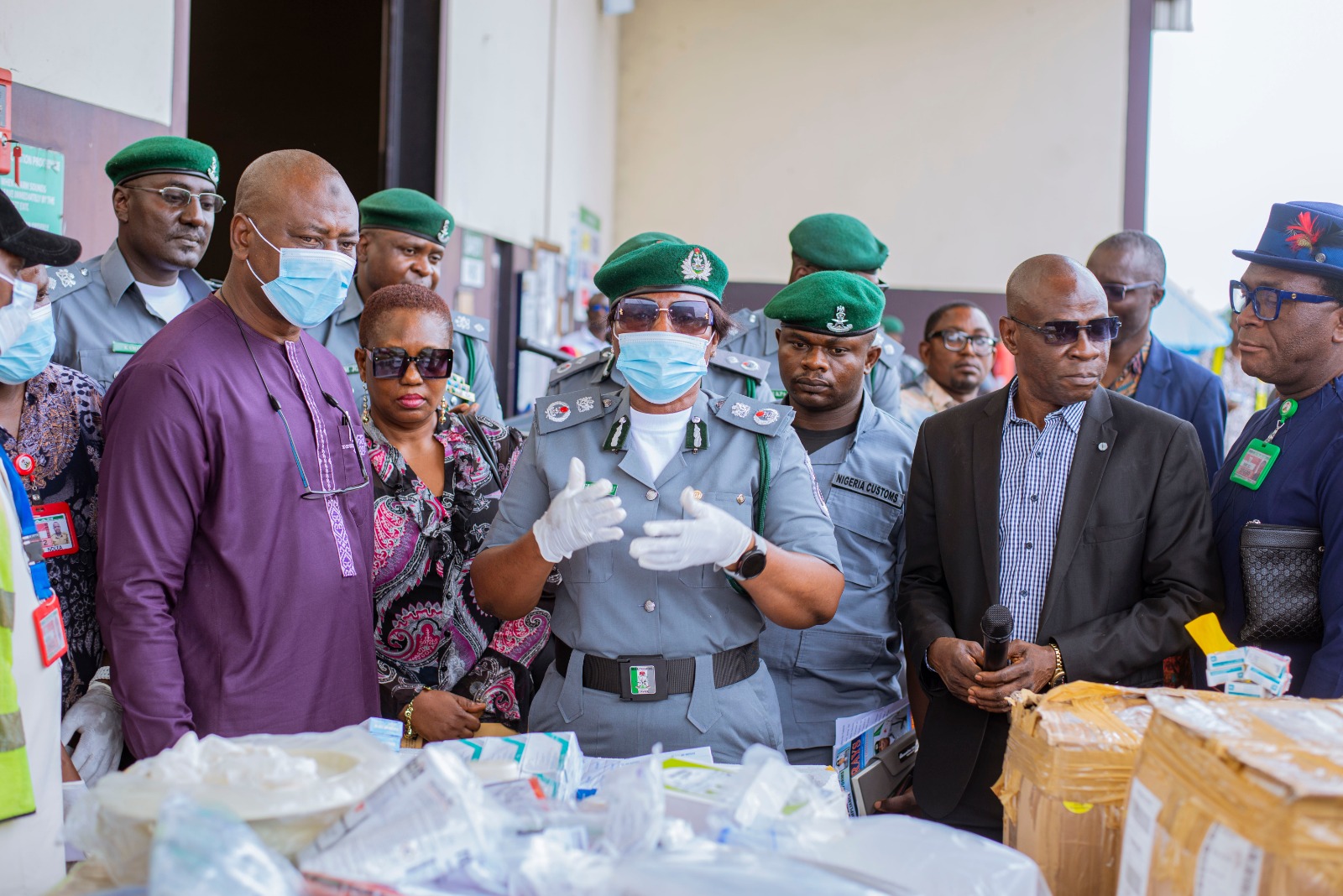
By Bon Peters
The Port Harcourt Area I Command of the Nigeria Customs Service (NCS) has handed over pharmaceutical products intercepted at the Omagwa International Airport recently to the National Agency for Food and Drug Administration and Control (NAFDAC).
The spokesman for the command, Mr Barilule Aanee, an Assistant Superintendent of Customs 1, said in a statement that the items were given to NAFDAC on February 12, 2026, at the NAHCO Shed of the airport, where the seizure occurred.
The Customs Area Controller of the command, Comptroller Salamatu Atuluku, disclosed that the interception was made during routine examination and intelligence-driven scrutiny at the NAHCO Shed by officers of the Command in collaboration with relevant agencies.
She disclosed that six packages of pharmaceutical products, including Menotrophin 150 IU injections, Progesterone, and Isifrane, as well as three packages of medicaments containing Tramadol Ratiopharm injections, were discovered in two separate consignments.
The products, according to the statement, were neither properly declared nor accompanied by the mandatory NAFDAC certification required for lawful importation into Nigeria.
The Customs Area 1 chief further revealed that one shipment, originating under the name Zecho Oil and Gas Nigeria Limited for Elite Health Pharmacy Ltd, with Airway Bill No. 020 34858250, weighing 135 kilograms and amounting to 4,300 units, transported by Lufthansa Cargo Airline, was among the seized products.
More so, another consignment on Allied Airway Bill No. 574 34543283 from Amsterdam was falsely declared as spare parts.
She emphasised that regardless of the importer or volume involved, “no pharmaceutical product is permitted entry into Nigeria without proper declaration and regulatory clearance from NAFDAC.”
Comptroller Atuluku commended the diligence of the Customs Intelligence Unit and all officers involved, stressing that sustained interagency cooperation remained vital to strengthening enforcement and preserving the integrity of the nation’s supply chain.
While receiving the items, the Deputy Director of the NAFDAC Port Inspection Directorate, Pharm. Adepoju Bayo Raufu, thanked the customs for its vigilance and prompt handover of the intercepted items.
He assured that the agency would subject the items to appropriate regulatory procedures in line with its mandate to safeguard public health.
Health
Accurate Multi-Panel Drug Test Cups For Professionals

In safety-sensitive workplaces, clinical settings, and staffing operations, reliable on-site drug screening is a practical first line of defense. Accurate multi-panel drug test cups for professionals combine speed with portability, allowing organizations to screen for multiple substances quickly while preserving chain-of-custody and sample integrity. This guide explains how these cups work, how to choose the right product for a professional setting, and how to manage administration, interpretation, and compliance to reduce legal risk and costly false positives.
What Multi-Panel Drug Test Cups Are And Who Should Use Them
Multi-panel drug test cups are self-contained immunoassay devices that screen a urine sample for multiple drug classes simultaneously, typically including amphetamines, cocaine metabolites, opioids, cannabinoids (THC), benzodiazepines, and others depending on the panel. They are designed for point-of-care use: a donor provides a urine specimen directly into the cup, and the integrated test strips produce rapid visual results within minutes.
Who should use them? Professionals that benefit most include:
- Occupational health and human resources teams conducting pre-employment, post-incident, or random testing programs.
- Substance use clinicians and treatment centers performing routine monitoring.
- Staffing firms and temp agencies that need quick screening before placement.
- Corrections and probation officers performing supervision checks.
- Employers in transportation, construction, healthcare, and manufacturing where safety is critical.
For organizations prioritizing both speed and defensibility, multi-panel cups offer a pragmatic balance: they provide immediate screening to inform next steps while still allowing for confirmatory laboratory testing when required.
How Multi-Panel Test Cups Work: Technology And Accuracy Factors
At their core, most multi-panel cups use lateral flow immunoassay technology. Antibodies embedded on test strips bind to drug metabolites in the specimen: a visible line forms (or disappears) according to the assay design, indicating a negative or presumptive positive.
Key accuracy factors to understand:
- Antibody specificity and cross-reactivity: High-quality assays use antibodies selected to minimize cross-reactivity with over-the-counter medications or endogenous compounds. Lower-grade tests may yield false positives when donors take legal medications that share similar metabolites.
- Cutoff concentrations: Each assay has a cutoff (measured in ng/mL) that determines whether a result is reported as positive. Most professional cups follow SAMHSA or DOT cutoffs for workplace testing: knowing these thresholds reduces misinterpretation.
- Temperature and matrix checks: Modern cups often integrate temperature strips and creatinine/oxidant checks to detect dilution or tampering. These integrity features improve the reliability of on-site results.
- Operator influence: Proper collection, timing, and result reading windows directly affect accuracy. Even the best cup can produce incorrect readings if the test is read too early or too late.
Real-world accuracy is often expressed in sensitivity (ability to detect positives) and specificity (ability to rule out negatives). Professional cups from reputable manufacturers typically report >95% agreement with laboratory immunoassays at the stated cutoffs, though confirmatory GC-MS or LC-MS/MS remains the gold standard for legal or employment consequences.
Choosing The Right Cup For Professional Settings
Selecting the appropriate multi-panel drug test cup requires more than picking a high panel count. It’s about matching features to use case, workflow, and legal requirements.
Key Selection Criteria
- Regulatory alignment: Choose cups that adhere to SAMHSA/DOT cutoffs if testing falls under federal guidelines.
- Built-in integrity checks: Temperature, adulteration, and creatinine tests help detect tampering or dilution at collection.
- Ease of use: Simple, unambiguous results and clear timing windows reduce operator error and training burden.
- Documentation options: Cups that help clear labeling, lot tracking, and photo documentation streamline chain-of-custody.
- Shelf life and storage needs: Longer shelf life and uncomplicated storage conditions simplify inventory management.
Panel Selection: Which Drugs To Include
Common professional panels are 5-, 8-, or 12-panel cups. Decisions should be risk-based:
- 5-panel: Standard workplace screens (AMP, COC, OPI, THC, BZO).
- 8–12 panel: Add methamphetamine, oxycodone, fentanyl, barbiturates, PCP, and others where clinical or workplace exposure warrants it.
Staffing and healthcare employers often opt for expanded panels that include fentanyl and synthetic opioids given their prevalence.
Sensitivity, Cutoffs, And False Positives
Higher sensitivity isn’t always better: it may detect clinically irrelevant low levels or passive exposure. Professional programs typically use established cutoffs to balance sensitivity and specificity. When a presumptive positive appears, organizations must have a policy for confirmatory testing rather than making employment decisions on a single cup result.
Adulteration Detection And Integrity Features
Buy cups with built-in tamper indicators: temperature strips (correct collection window), creatinine or pH checks, and oxidant detection. These features lower the likelihood of undetected sample manipulation and strengthen the defensibility of the screening process.
Best Practices For Collection And Administration
Accurate results start with consistent collection procedures and well-trained staff.
Chain Of Custody And Documentation
Maintain an unbroken chain of custody: donor identification, time-stamped collection, witness signatures, and secure transport for confirmatory samples. Use standardized forms and consider photo documentation or barcode systems that tie cups to donor records. This reduces disputes and protects both employer and donor.
Proper Sample Collection And Handling Steps
- Verify donor identity and inspect the collection area for prohibited items.
- Instruct the donor to provide an adequate volume into the cup: record temperature immediately.
- Observe, where policy and law permit, to prevent substitution.
- Seal and label samples promptly if they will be sent for confirmatory testing.
- Adhere to manufacturers’ timing for reading results: most cups specify a 5–10 minute window.
Training Staff And Reducing Human Error
Regular staff training on procedure, result interpretation, and documentation reduces mistakes. Provide quick-reference guides, role-play common scenarios, and audit collections periodically to ensure compliance.
Interpreting Results And When To Confirm
On-site cups deliver presumptive results, actionable only within a clear policy framework.
Reading Immunoassay Results Correctly
Most cups use a two-line format: a control line indicating the test is valid, and a test line indicating a negative or positive depending on the device. A faint test line usually indicates a negative result at or above the cutoff: no test line indicates a presumptive positive. Staff should follow the manufacturer’s visual guide and timing strictly. Photographing results can help document ambiguous cases.
Confirmatory Testing: When And How To Send Samples
Any presumptive positive that could have employment consequences should be sent to a certified laboratory for confirmatory testing using gas chromatography–mass spectrometry (GC-MS) or liquid chromatography–tandem mass spectrometry (LC-MS/MS). It’s best practice to split or retain an aliquot during collection for immediate confirmatory shipment if required. Establish relationships with accredited labs and clarify reporting timeframes, cutoff standards, and evidence handling procedures.
Legal, Regulatory, And Privacy Considerations
Testing programs operate in a regulated and privacy-sensitive environment: mishandling can result in litigation or regulatory penalties.
Compliance With Workplace Testing Regulations
Understand federal, state, and industry-specific regulations that apply to the organization. Transportation and DOT-regulated employees face stricter protocols, specific cutoffs, and certified collector requirements. Non-DOT employers still should align policies with best practices to maintain defensibility.
Recordkeeping, Privacy, And Liability Best Practices
Limit access to test results to authorized personnel, store records securely, and retain documentation according to legal retention requirements. Clear written policies that explain testing rationale, disciplinary procedures, and the appeals process help mitigate liability. Include provisions for reasonable accommodations and medical review officers (MROs) who assess legitimate medical explanations for positive results.
Storage, Shelf Life, And Vendor Reliability
Purchasing decisions affect accuracy and supply-chain resilience.
Storage Conditions, Expiry, And Inventory Management
Store cups per manufacturer recommendations, usually at controlled room temperature away from direct sunlight. Track lot numbers and expiration dates in inventory systems and rotate stock using FIFO principles. Expired tests can degrade antibody performance and increase error rates.
Evaluating Suppliers And Quality Assurance Practices
Work with suppliers that provide lot-level COAs (Certificates of Analysis), recall notifications, and prompt customer support. Vet vendors for ISO or other quality certifications, clear warranty policies, and responsiveness to post-sale technical questions. For agencies that manage testing programs for clients, documented supplier reliability reduces operational risk and preserves client trust.
Conclusion
Accurate multi-panel drug test cups for professionals are a practical tool when used within a rigorously designed program: choose products that match regulatory requirements, incorporate integrity checks, and come from reliable vendors. Combine those choices with standardized collection procedures, trained staff, and clear confirmatory pathways to reduce false positives and legal exposure.
For agencies and businesses that support client organizations, whether staffing firms or occupational health providers, investing in the right cups and operational controls pays off in defensible screening results and smoother downstream workflows. When testing has real consequences, a presumptive result from a quality cup should be the beginning of a controlled process, not the final word.
-

 Feature/OPED6 years ago
Feature/OPED6 years agoDavos was Different this year
-
Travel/Tourism10 years ago
Lagos Seals Western Lodge Hotel In Ikorodu
-

 Showbiz3 years ago
Showbiz3 years agoEstranged Lover Releases Videos of Empress Njamah Bathing
-

 Banking8 years ago
Banking8 years agoSort Codes of GTBank Branches in Nigeria
-

 Economy3 years ago
Economy3 years agoSubsidy Removal: CNG at N130 Per Litre Cheaper Than Petrol—IPMAN
-

 Banking3 years ago
Banking3 years agoSort Codes of UBA Branches in Nigeria
-

 Banking3 years ago
Banking3 years agoFirst Bank Announces Planned Downtime
-

 Sports3 years ago
Sports3 years agoHighest Paid Nigerian Footballer – How Much Do Nigerian Footballers Earn


